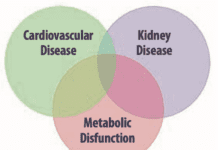Increasing lean muscle mass-already known to be important to fight frailty with aging (a condition called sarcopenia)-may also help protect against diabetes. A new study reports that every additional 10% of skeletal muscle mass was associated with an 11% reduction in insulin resistance and a 12% lower risk of transitional, prediabetes or diabetes.
While we knew there was a relationship between metabolic disorders and very low muscle mass, says lead researcher Preethi Srikanthan, MD, of the University of California-Los Angeles, we were surprised to find that this relationship was preserved across the range of muscle mass.
Dr. Srikanthan and colleagues examined data on 13,644 participants in the National Health and Nutrition Examination Survey (NHANES) III, from 1988 to 1994. When researchers compared the one-quarter of participants with the most muscle mass with those at the bottom of the spectrum, those with the greatest muscle mass were 63% less prone to diabetes.
When the results were adjusted to omit people already suffering from diabetes, the association between muscle mass and improved insulin resistance was even stronger. The benefits of increasing muscle mass went beyond countering the metabolic effects of sarcopenia: Increases in muscle mass above even average levels were associated with additional protection against insulin resistance and prediabetes.
Insulin resistance is a condition in which the bodys muscle, fat and liver cells dont respond properly to insulin, a hormone made by the pancreas that helps cells take in and use glucose. As a result, excess glucose-a form of sugar thats the bodys main source of energy-builds up in the bloodstream, setting the stage for diabetes.
According to Dr. Srikanthan, Our findings suggest that beyond focusing on losing weight to improve metabolic health, there may be a role for maintaining fitness and building muscle mass. This is a welcome message for many overweight patients who experience difficulty in achieving weight loss, as any effort to get moving and keep fit should be seen as laudable and contributing to metabolic change.
The study was cross-sectional rather than interventional, so the researchers cant say for certain that increasing your muscle mass will lower your risk of developing insulin resistance or pre-diabetes.
TO LEARN MORE: Journal of Clinical Endocrinology and Metabolism, September 2011; abstract at dx.doi.org/10.1210/jc.2011-0435. National Diabetes Information Clearinghouse diabetes.niddk.nih.gov/dm/pubs/insulinresistance























